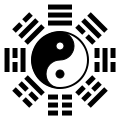| Part of a series on |
| Taoism |
|---|
 |
| Part of a series on |
| Chinese cuisine |
|---|
 |
While there are many historical and modern schools of Taoism with different teachings on the subject, many Taoist priests [ who? ] regard their diet as extremely important to their physical, mental and spiritual health in one way or another, especially where the amount of qi in the food is concerned.
